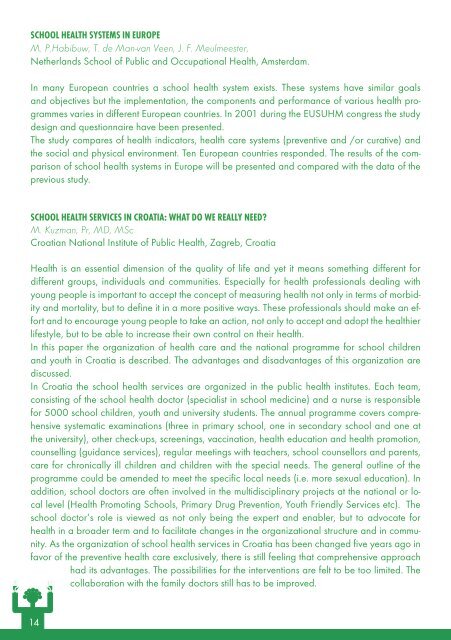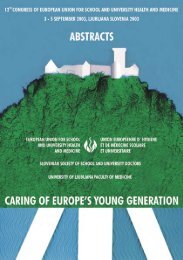abstract ok.indd - eusuhm
abstract ok.indd - eusuhm
abstract ok.indd - eusuhm
Create successful ePaper yourself
Turn your PDF publications into a flip-book with our unique Google optimized e-Paper software.
SCHOOL HEALTH SYSTEMS IN EUROPE<br />
M. P.Habibuw, T. de Man-van Veen, J. F. Meulmeester,<br />
Netherlands School of Public and Occupational Health, Amsterdam.<br />
In many European countries a school health system exists. These systems have similar goals<br />
and objectives but the implementation, the components and performance of various health programmes<br />
varies in different European countries. In 2001 during the EUSUHM congress the study<br />
design and questionnaire have been presented.<br />
The study compares of health indicators, health care systems (preventive and /or curative) and<br />
the social and physical environment. Ten European countries responded. The results of the comparison<br />
of school health systems in Europe will be presented and compared with the data of the<br />
previous study.<br />
SCHOOL HEALTH SERVICES IN CROATIA: WHAT DO WE REALLY NEED?<br />
M. Kuzman, Pr, MD, MSc<br />
Croatian National Institute of Public Health, Zagreb, Croatia<br />
Health is an essential dimension of the quality of life and yet it means something different for<br />
different groups, individuals and communities. Especially for health professionals dealing with<br />
young people is important to accept the concept of measuring health not only in terms of morbidity<br />
and mortality, but to define it in a more positive ways. These professionals should make an effort<br />
and to encourage young people to take an action, not only to accept and adopt the healthier<br />
lifestyle, but to be able to increase their own control on their health.<br />
In this paper the organization of health care and the national programme for school children<br />
and youth in Croatia is described. The advantages and disadvantages of this organization are<br />
discussed.<br />
In Croatia the school health services are organized in the public health institutes. Each team,<br />
consisting of the school health doctor (specialist in school medicine) and a nurse is responsible<br />
for 5000 school children, youth and university students. The annual programme covers comprehensive<br />
systematic examinations (three in primary school, one in secondary school and one at<br />
the university), other check-ups, screenings, vaccination, health education and health promotion,<br />
counselling (guidance services), regular meetings with teachers, school counsellors and parents,<br />
care for chronically ill children and children with the special needs. The general outline of the<br />
programme could be amended to meet the specific local needs (i.e. more sexual education). In<br />
addition, school doctors are often involved in the multidisciplinary projects at the national or local<br />
level (Health Promoting Schools, Primary Drug Prevention, Youth Friendly Services etc). The<br />
school doctor‘s role is viewed as not only being the expert and enabler, but to advocate for<br />
health in a broader term and to facilitate changes in the organizational structure and in community.<br />
As the organization of school health services in Croatia has been changed five years ago in<br />
favor of the preventive health care exclusively, there is still feeling that comprehensive approach<br />
had its advantages. The possibilities for the interventions are felt to be too limited. The<br />
collaboration with the family doctors still has to be improved.<br />
14




